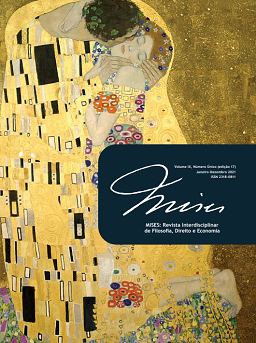The Six Lessons of Mises
a reflection of Public Policies in Times of Pandemic
DOI:
https://doi.org/10.30800/mises.2021.v9.1388Keywords:
public policy, pandemic, economic freedom principlesAbstract
From the perspective of the market as a process, the market only exists to the extent that exchanges take place. So, what is better in times of social isolation: intervene to ensure that the market works or let the market freeze freely? Moreover, to what extent is it possible to intervene in the market in times of pandemic, preserving the principles of economic freedom? Based on the principles of cooperation and economic calculation proposed by Mises, the objective of this paper is to analyze the possibilities of public policy in a situation of social isolation. Among the main public policy devised in this time of the pandemic, the following measures have provided the continuity of the market process: credit, tax deferrals, and emergency assistance or paycheck protection program. The concern with the preservation of the economic calculation extends to all supply chain linkages, including final customers, for to companies continue to do their economic calculation.
Downloads
References
GEREFFI, G.; FERNANDEZ-STARK, K. Global Value Chain Analysis: a primer. Center on Globalization, Governance & Competitiveness (CGGC), Duke University, Durham, Noth Carolina, 2011
HAYEK, F.A. Os erros fatais do Socialismo – Por que a teoria não funciona na prática. Faro Editora, 2019.
MISES, Ludwig von. As seis lições. São Paulo: Instituto Ludwig von Mises Brasil, 2009. https://mises.org.br/Ebook.aspx?id=16
OECD. Economic Outlook, v. 2020, Issue 1, p. 1-336, Paris: OECD, 2020.
SILVA E MEIRELLES. Teorias de mercado e regulação: por que os mercados e o governo falham? CADERNOS EBAPE. BR, Vol. 8, No. 4, 2010: p. 644-660.
Downloads
Published
How to Cite
Issue
Section
License
Copyright (c) 2021 MISES: Interdisciplinary Journal of Philosophy, Law and Economics

This work is licensed under a Creative Commons Attribution 4.0 International License.

This Journal is licensed under a Creative Commons Attribution 4.0 International License.


















